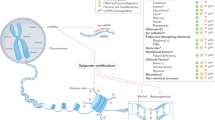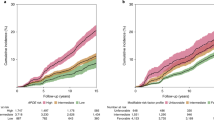Abstract
Young onset dementia (YOD) is associated with significant costs and burden, but its cause is poorly understood. The aim of this review was to determine whether environmental and lifestyle factors are associated with risk for non-autosomal dominant degenerative and vascular YOD. Academic databases were searched to March 2015 for studies assessing the impact of modifiable factors (e.g. education, cardiovascular illness, psychiatric illness, alcohol use) in participants under 65 years at symptom onset. Cardiovascular illness, traumatic brain injury, psychiatric illness, heavy alcohol use and estrogen-related factors were identified as potential risk factors for YOD. Evidence for education, childhood development, smoking and heavy metal exposure was inconsistent or of poor quality. A dose–response relationship was found between cumulative and/or increasing severity of exposure and risk for YOD. Environmental and lifestyle risk factors may be relevant to YOD, particularly with severe or cumulative exposure. More high quality research is required to confirm which factors confer risk and when.

Similar content being viewed by others
References
World Health Organisation. Dementia: a public health priority. World Health Organisation. 2012. Cited 2015 Jan 26. http://apps.who.int/iris/handle/10665/75263.
Koedam EL, Pijnenburg YA, Deeg DJ, et al. Early-onset dementia is associated with higher mortality. Dement Geriatr Cogn Disord. 2008;26(2):147–52.
Rosness TA, Barca ML, Engedal K. Occurrence of depression and its correlates in early onset dementia patients. Int J Geriatr Psychiatry. 2010;25(7):704–11.
Arai A, Matsumoto T, Ikeda M, et al. Do family caregivers perceive more difficulty when they look after patients with early onset dementia compared to those with late onset dementia? Int J Geriatr Psychiatry. 2007;22(12):1255–61.
Freyne N, Kidd R, Coen BA, et al. Burden in carers of dementia patients: higher levels in carers of younger sufferers. Int J Geriatr Psychiatry. 1999;14(9):784–8.
Vickland V, Morris T, Draper B, et al. Modelling the impact of interventions to delay the onset of dementia in Australia. Alzheimer’s Australia. 2012. https://fightdementia.org.au/sites/default/files/201212_NAT_AAnumberedPub_Paper30final.pdf. Accessed 15 May 2014.
Rossor MN, Fox NC, Mummery CJ, et al. The diagnosis of young-onset dementia. Lancet Neurol. 2010;9(8):793–806.
Withall A, Draper B, Seeher K, et al. The prevalence and causes of younger onset dementia in Eastern Sydney, Australia. Int Psychogeriatr. 2014;26(12):1955–65.
Garre-Olmo J, Batlle DG, del Mar Fernandez M, et al. Incidence and subtypes of early-onset dementia in a geographically defined general population. Neurology. 2010;75(14):1249–55.
Kelley BJ, Boeve BF, Josephs KA. Young-onset dementia: demographic and etiologic characteristics of 235 patients. Arch Neurol. 2008;65(11):1502–8.
Harvey RJ, Skelton-Robinson M, Rossor MN. The prevalence and causes of dementia in people under the age of 65 years. J Neurol Neurosurg Psychiatry. 2003;74(9):1206–9.
Jarmolowicz AI, Chen H-Y, Panegyres PK. The Patterns of inheritance in early-onset dementia Alzheimer’s disease and frontotemporal dementia. Am J Alzheimers Dis Other Demen. 2014;30(3):299–306.
Rohrer JD, Guerreiro R, Vandrovcova J, et al. The heritability and genetics of frontotemporal lobar degeneration. Neurology. 2009;73(18):1451–6.
Wingo TS, Lah JJ, Levey AI, et al. Autosomal recessive causes likely in early-onset Alzheimer disease. Arch Neurol. 2012;69(1):59–64.
Prince M, Albanese E, Guerchet M, et al. World Alzheimer Report 2014: dementia and risk reduction, an analysis of protective and modifiable factors. Alzheimer’s Disease International. 2014. http://www.alz.co.uk/research/world-report-2014. Accessed 5 Jan 2014.
World Health Organization. The ICD-10 classification of mental and behavioural disorders: clinical descriptions and diagnostic guidelines. 1992. World Health Organization. http://apps.who.int/iris/handle/10665/37958. Accessed 5 Oct 2015.
American Psychiatric Association. DSM-IV-TR: diagnostic and statistical manual of mental disorders, text revision. Arlington: American Psychiatric Publishing; 2000.
American Psychiatric Association. DSM 5. Arlington: American Psychiatric Publishing; 2013.
McKhann G, Drachman D, Folstein M, et al. Clinical diagnosis of Alzheimer’s disease: report of the NINCDS–ADRDA Work Group under the auspices of Department of Health and Human Services Task Force on Alzheimer’s Disease. Neurology. 1984;34(7):939.
Rascovsky K, Hodges JR, Knopman D, et al. Sensitivity of revised diagnostic criteria for the behavioural variant of frontotemporal dementia. Brain. 2011;134(9):2456–77.
Neary D, Snowden JS, Gustafson L, et al. Frontotemporal lobar degeneration: a consensus on clinical diagnostic criteria. Neurology. 1998;51(6):1546–54.
McKhann GM, Albert MS, Grossman M, et al. Clinical and pathological diagnosis of frontotemporal dementia: report of the Work Group on Frontotemporal Dementia and Pick’s Disease. Arch Neurol. 2001;58(11):1803–9.
McKeith IG, Galasko D, Kosaka K, et al. Consensus guidelines for the clinical and pathologic diagnosis of dementia with Lewy bodies (DLB): report of the consortium on DLB international workshop. Neurology. 1996;47(5):1113–24.
Merlin T, Weston A, Tooher R. Extending an evidence hierarchy to include topics other than treatment: revising the Australian ‘levels of evidence’. BMC Med Res Methodol. 2009;9(1):34.
Van Duijn CM, Tanja TA, Haaxma R, et al. Head trauma and the risk of Alzheimer’s disease. Am J Epidemiol. 1992;135(7):775–82.
Nordström P, Nordström A, Eriksson M, et al. Risk factors in late adolescence for young-onset dementia in men: a nationwide cohort study. JAMA Intern Med. 2013;173(17):1612–8.
Nyberg J, Åberg MAI, Schiöler L, et al. Cardiovascular and cognitive fitness at age 18 and risk of early-onset dementia. Brain. 2014;137(5):1514–23.
Whalley LJ, Thomas BM, Starr JM. Epidemiology of presenile Alzheimer’s disease in Scotland (1974–1988): 2. exposures to possible risk factors. Br J Psychiatry. 1995;167:732–8.
Heath CA, Mercer SW, Guthrie B. Vascular comorbidities in younger people with dementia: a cross-sectional population-based study of 616 245 middle-aged people in Scotland. J Neurol Neurosurg Psychiatry. 2014;86:959–64.
Forster DP, Newens AJ, Kay DW, et al. Risk factors in clinically diagnosed presenile dementia of the Alzheimer type: a case-control study in northern England. J Epidemiol Community Health. 1995;49(3):253–8.
Van Duijn CM, Hofman A. Relation between nicotine intake and Alzheimer’s disease. BMJ. 1991;302(6791):1491–4.
Tyas SL, Pederson LL, Koval JJ. Is smoking associated with the risk of developing Alzheimer’s disease? Results from three Canadian data sets. Ann Epidemiol. 2000;10(7):409–16.
Nordström P, Michaëlsson K, Gustafson Y, et al. Traumatic brain injury and young onset dementia: a nationwide cohort study. Ann Neurol. 2014;75(3):374–81.
Wu K-Y, Chang C-M, Liang H-Y, et al. Increased risk of developing dementia in patients with bipolar disorder: a nested matched case-control study. Bipolar Disord. 2013;15(7):787–94.
Mikkelsen S. A cohort study of disability pension and death among painters with special regard to disabling presenile dementia as an occupational disease. Scand J Soc Med. 1980;16(Suppl 1):34–43.
Slooter AJ, Bronzova J, Witteman JC, et al. Estrogen use and early onset Alzheimer’s disease: a population-based study. J Neurol Neurosurg Psychiatry. 1999;67(6):779–81.
Phung TKT, Waltoft BL, Laursen TM, et al. Hysterectomy, oophorectomy and risk of dementia: a nationwide historical cohort study. Dement Geriatr Cogn Disord. 2010;30(1):43–50.
Chen P-L, Yang C-W, Tseng Y-K, et al. Risk of dementia after anaesthesia and surgery. Br J Psychiatry. 2014;204(3):188–93.
McMurtray AM, Clark DG, Christine D, et al. Early-onset dementia: frequency and causes compared to late-onset dementia. Dement Geriatr Cogn Disord. 2006;21(2):59–64.
McMurtray AM, Ringman J, Chao SZ, et al. Family history of dementia in early-onset versus very late-onset Alzheimer’s disease. Int J Geriatr Psychiatry. 2006;21(6):597–8.
Carotenuto A, Rea R, Colucci L, et al. Late and early onset dementia: what is the role of vascular factors? A retrospective study. J Neurol Sci. 2012;322(1–2):170–5.
Panegyres PK, Chen H-Y. Early-onset Alzheimer’s disease: a global cross-sectional analysis. Eur J Neurol. 2014;21(9):1149–54.
Sener U, Hershey L, Prodan C, et al. Comparison of risk factors for early-onset versus late-onset Alzheimer disease. Ann Neurol. 2014;76:S96.
Virta JJ, Heikkilä K, Perola M, et al. Midlife cardiovascular risk factors and late cognitive impairment. Eur J Epidemiol. 2013;28(5):405–16.
Luchsinger J, Reitz C, Honig LS, et al. Aggregation of vascular risk factors and risk of incident Alzheimer disease. Neurology. 2005;65(4):545–51.
Kivipelto M, Ngandu T, Laatikainen T, et al. Risk score for the prediction of dementia risk in 20 years among middle aged people: a longitudinal, population-based study. Lancet Neurol. 2006;5(9):735–41.
Smith K, Flicker L, Lautenschlager NT, et al. High prevalence of dementia and cognitive impairment in indigenous Australians. Neurology. 2008;71(19):1470–3.
Li SQ, Guthridge SL, Aratchige PE, et al. Dementia prevalence and incidence among the Indigenous and non-Indigenous populations of the Northern Territory. Med J Aust. 2014;200(8):465–9.
Radford K, Mack HA, Draper B, et al. Prevalence of dementia in urban and regional Aboriginal Australians. Alzheimer’s Dement. 2015;11(3):271–9.
Parker RM. Dementia in Aboriginal and Torres Strait Islander people. Med J Aust. 2014;200(8):435–6.
Anstey KJ, Mack HA, Cherbuin N. Alcohol consumption as a risk factor for dementia and cognitive decline: meta-analysis of prospective studies. Am J Geriatr Psychiatry. 2009;17(7):542–55.
Byers AL, Yaffe K. Depression and risk of developing dementia. Nat Rev Neurol. 2011;7(6):323–31.
Power MC, Weuve J, Gagne JJ, et al. The association between blood pressure and incident Alzheimer disease: a systematic review and meta-analysis. Epidemiology. 2011;22(5):646–59.
Valenzuela MJ, Sachdev P. Brain reserve and dementia: a systematic review. Psychol Med. 2006;36(4):441–54.
Draper B, Melding P, Brodaty H. Psychogeriatric service delivery: an international perspective. Oxford: Oxford University Press; 2005.
van Vliet D, de Vugt ME, Bakker C, et al. Time to diagnosis in young-onset dementia as compared with late-onset dementia. Psychol Med. 2013;43(2):423–32.
Banerjee D, Chung S, Wong EC, et al. Underdiagnosis of hypertension using electronic health records. Am J Hypertens. 2012;25(1):97–102.
Low L-F, Yap MH, Brodaty H. Will testing for apolipoprotein E assist in tailoring dementia risk reduction? A review. Neurosci Biobehav Rev. 2010;34(3):408–37.
Jordan BD, Relkin NR, Ravdin LD, et al. Apolipoprotein e4 associated with chronic traumatic brain injury in boxing. JAMA. 1997;278(2):136–40.
Acknowledgments
This work was funded by grants from the Alzheimer’s Australia Dementia Research Foundation, Brain Sciences UNSW and the National Health and Medical Research Council (1008267). It was conducted at the Dementia Collaborative Research Centre—Assessment and Better Care, University of New South Wales, Australia. The authors would like to acknowledge the assistance of Ms Fiona White and Dr Katrin Seeher in the review and writing process.
Author information
Authors and Affiliations
Corresponding author
Rights and permissions
About this article
Cite this article
Cations, M., Withall, A., Low, LF. et al. What is the role of modifiable environmental and lifestyle risk factors in young onset dementia?. Eur J Epidemiol 31, 107–124 (2016). https://doi.org/10.1007/s10654-015-0103-9
Received:
Accepted:
Published:
Issue Date:
DOI: https://doi.org/10.1007/s10654-015-0103-9




